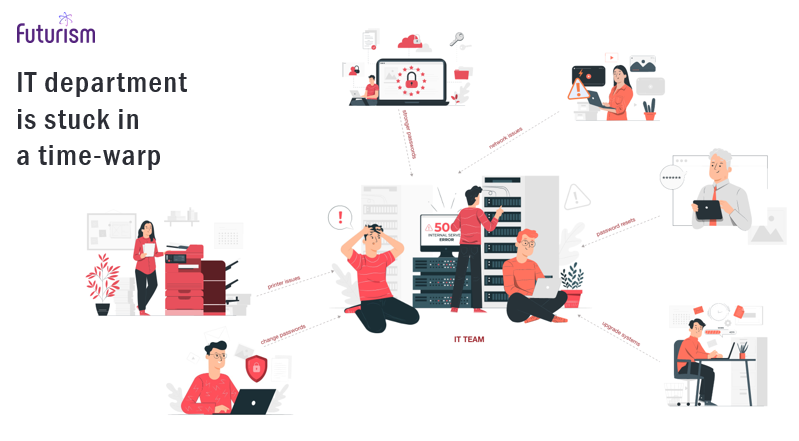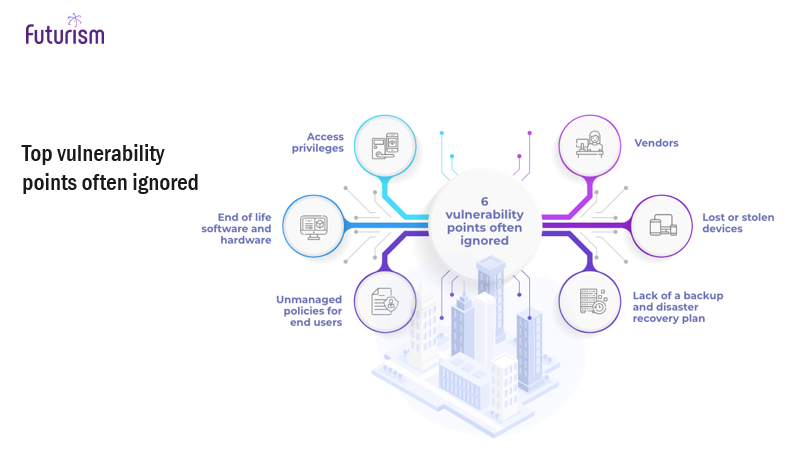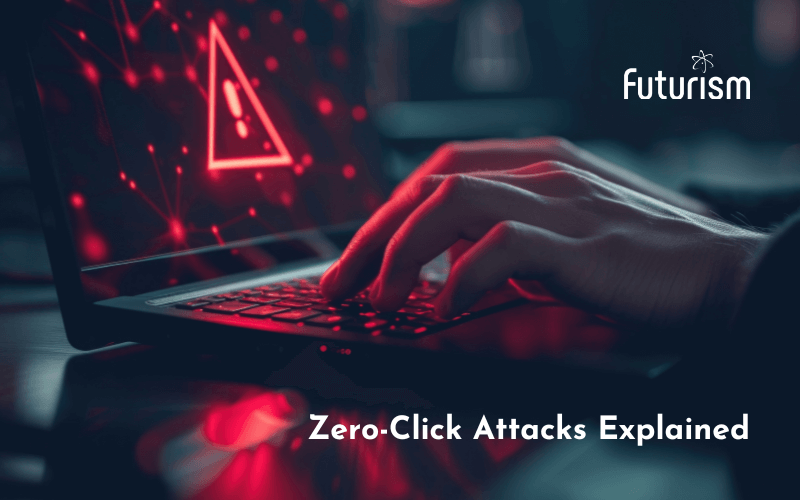Cybersecurity for Rural Hospitals: How can Rural Hospitals become Cyber Smart?

Futurism Technologies
February 8, 2022 - 1.2K
5 Min Read
According to a recent cybersecurity advisory released by the American Hospital Association (AHA), health care organizations across the U.S. are at high risk of cyberattacks in the light of the Russia-Ukraine conflict (Source: AHA). Hospitals and health care systems may be targeted directly or become victims of Russian-backed threat actors leading to operational disruptions. With rural communities representing 20% of the U.S. population, the impact of an attack on rural hospitals can be huge affecting millions of people.
Size doesn’t matter
Did you know? – Rural hospitals were compromised at nearly the same rate as large hospitals. (Source: Critical Insight)
Rural hospitals lack the privilege and access to resources enjoyed by their larger counterparts (hospitals/providers), with many being already running on shoestring budget and thin profit margins coupled with lack of awareness pertaining to security at the board level. Lack of capital, staff crunch and a suboptimal revenue cycle are some of the critical factors that prevent rural hospitals to leverage the same technology and security layers as their larger counterparts.
This puts rural hospitals on the underprivileged side of the great digital divide with pandemic worsening the gap further. This extends to cybersecurity for rural hospitals as well. Small rural healthcare facilities often lack the budget to hire full-time security experts to secure their systems and sensitive patient information leaving them in a black hole.

Rural hospitals lack the leadership of a CIO or a skilled IT team, making it a challenge for them to embrace new technologies. Though efforts to strengthen cybersecurity for rural hospitals are important, getting help is often deemed as unimportant for these hospitals that are often challenged by lack of access to skilled IT/security resources coupled with communication/knowledge gap between the IT team and CEOs/Board Members.
Did you know?
According to IBM, the gap between available qualified cybersecurity professionals and unfulfilled positions will reach a staggering 1.8 million by the end of 2022. (Source: IBM)
The problem isn’t going away anytime soon!
A recent Wall Street Journal report unraveled some chilling details of the cost and aftereffects triggered by cyberattacks on rural healthcare facilities in the recent past. Some healthcare providers had to exclusively resort to using paper documentation and turn away their patients until they were able to restore or rebuild their affected systems. In certain extreme cases, the providers had to shut their operations for good. The report also cited a study conducted by the Ponemon Institute and IBM that found healthcare to be the most affected industry enduring from some of the most brutal and expensive breaches in recent times. The smaller the size of a hospital, the more likely its security/IT system will be breached, found the study.

In another report by the Almanac of Hospital Financial and Operating Indicators, rural hospitals with annual revenue below $200 million tend to generate median profit margins ranging from 0.7% to 0.6%. With such breakeven margins, cybersecurity for rural hospitals is often deemed as a distant dream. In the event of a breach, most of these health care providers are left with no option but to shutdown. This is why cybersecurity for rural hospitals is more important than ever.
Cybersecurity for rural hospitals: It’s time rural hospitals ask for help!
CEOs, Board Members, CIOs, and CTOs of rural healthcare facilities should focus on helping their IT people in terms of security and compliance. This is the reason a large number of rural hospitals are partnering with managed security partners to help them put security at the heart of everything they do. Having a trusted security services partner to handle a hospital’s IT and security challenges is a boon when it comes to reduce the demands placed on its IT team (often understaffed) while taming costs and optimizing IT and digital investments.
Futurism Technologies is a trusted security services vendor that provides a variety of managed security services including advanced threat protection (SIEM), endpoint security and mobile device management, insider threat detection, vulnerability scanning, threat detection and response, etc. to empower a rural hospital when it comes to cybersecurity. Creating cyber awareness helps to overcome the manifold challenges faced by small IT teams and limited resources of rural hospitals and smaller specialty clinics. This will not only help with build rapid incident respond capabilities, but would also help with cyber preparedness.
Rural hospitals ought to perceive cybersecurity as a top priority and start employing the right security skills and protection to keep hackers and attackers at bay. Cyber criminals use several attack points to gain access to a hospital’s critical networks, systems and sensitive patient data. All it takes is a loosely secured access point and a bit of human error, and you’re breached.
Often, security risk assessment is typically handed over to the person responsible for IT in a rural healthcare setting. Nevertheless, it is always advisable to have an external security professional do the job. Yes, a “second set of eyes” will identify blind spots that are often overlooked by the hospital’s IT staff.
Read also: The Ultimate Cybersecurity Checklist for Hospitals
Top 8 vulnerability points hackers often target in hospital cyber attacks

1. Unpatched healthcare systems/EHRs
Unpatched healthcare information systems continue to be the most common entry points leaving rural hospitals vulnerable to attacks.
2. Email and unprotected websites
Phishing emails get difficult to detect with each passing day. You need a combination of technology and user awareness to combat this cyber menace in a rural healthcare setting.
3. Unprotected mobile devices and insider threats
Most healthcare workers are given mobile access to sensitive files on the very first day of work, which can be dangerous for a hospital.
4. Connected medical devices (IoT)
Most connected medical devices lack built-in endpoint security features. Cameras and badge readers are at risk too. Without proper protection, these devices can be hacked.
5. Lack of firewall and strong network protection
Cyber attackers could shut down a hospital’s network if it lacks a strong firewall and network protection.
6. Using outdated or end-of-life OS/devices
Using outdated systems or devices puts hospitals at a higher risk for exploitation by malicious hackers resulting in costly data loss.
7. Lost or stolen devices
Lost or stolen devices pose a serious threat to hospitals. Once in wrong hands, the user can easily access the system using old or stored login data.
8. Unrestricted access to health systems/insider threats
Health systems and connected medical devices are easy targets for threat actors and unauthorized personnel.
5 vulnerability points often ignored
Healthcare organizations often neglect basic cybersecurity hygiene. Without keeping cybersecurity on top, hackers will keep gaining an upper hand.

- Access privileges: Unmanaged firewall configurations and remote access, lack of access policies for employees and vendors.
- End of life software and hardware: Vendors stop providing patches and using out-of-date and high-risk technology such as java applets.
- Unmanaged policies for end users: Lack of website control and application download control, sharing credentials, etc.
- Vendors: Hospitals work with vendors (insurance companies, etc.) without assessing the accompanying security risks.
- Lack of a backup and disaster recovery plan: The quickest way to recover from an attack is to rebuild all the breached systems. A good backup and disaster recovery plan can help.
How Futurism can ramp up cybersecurity for rural hospitals?
Attackers today are well aware of the fact that cyber budgets are super low and most healthcare facilities especially rural hospitals and small specialty clinics run on outdated technology and lack the skills, tools and budget to prevent these attacks. Additionally, these rural healthcare providers face economic challenges when it comes to digital transformation. This lack of resources and budget creates additional IT challenges requiring smaller rural hospitals to figure out how to do more with less.
Read also: Digital Transformation in Healthcare – Help is Just a Click Away!
Getting help from a managed security service provider is a great step to counter these attacks and keep health care personnel and clinicians focus more on patient care. Futurism can help rural hospitals strengthen their cybersecurity posture by providing them with the right layers of protection and resources across entire threat landscape, all for less than the cost of point products and expensive resources. Futurism cybersecurity services for rural hospitals are designed to help rural healthcare providers and small specialty clinics leverage the power of industry-leading security tech (IBM) such as IBM QRadar, IBM Watson AI, IBM MaaS360, IBM Verify Access, IBM Guardium, etc. to help them strengthen their IT systems, meet compliance, and secure patient information from coming-of-age attacks.
Futurism Managed Cybersecurity Services for Rural Hospitals
Futurism Managed Email Security
Fact – Most healthcare attacks come through mail!
Get protection against coming-of-age malware and new strands of Ransomware and spear-phishing attacks with Futurism Email Security service.
Futurism Web Security
Fact – ‘Web’ is used in more than 90% of malware attacks affecting over 18 million businesses each week.
Deploy a powerful line of defense against advanced web threats and reduce a great deal of burden on your security and IT crew with Futurism Web Security service.
Futurism Managed Endpoint Detection Response (EDR)
Fact – More than 550,000 new pieces of malware are detected every day.
Hunt and stop threats on the go and strengthen your hospital’s security posture with Futurism Managed Endpoint Detection Response services.
Unified Endpoint Management/Mobile Device Management
Fact – One in 10 serious threats are discovered on mobile devices.
Get unparalleled protection against advanced mobile threats with industry-leading mobile threat defense technology (IBM MaaS360) with EndPoint Secure, Unified Endpoint Management/Mobile Device Management services.
Futurism Eagle Eye (SIEM) – Advanced Threat Detection powered by IBM QRadar
Fact – On an average, it takes 280 days for an organization to detect and contain a breach!
Get up-to-the-minute protection from advanced threats including multi-prong attacks and new strands of Ransomware with Futurism Eagle Eye – advanced managed SIEM service powered by IBM QRadar.
Insider Threat Detection
Fact – More than 70% of breaches involve privileged accounts abuse!
Identify weak spots or endpoints and keep cyber attackers at bay with Futurism Insider Threat Detection cybersecurity services for rural hospitals.
Database Security (Futurism Data-Protect)
Fact – More than 75% organizations lack a sound data protection and incident response plan.
Futurism Data-Protect (powered by IBM Guardium) is a data-centric cybersecurity service for rural hospitals that offers comprehensive data protection, centralized visibility and strong monitoring capabilities to identify data theft or unauthorized access.
Vulnerability Assessment & Penetration Testing (VAPT)
Fact – Unpatched systems account for more than 60% of data breaches!
Identify potential network security threats and risk areas across your hospital’s IT environment with Futurism Vulnerability Assessment & Pen Testing or VAPT services.
EndPoint Secure (powered by IBM MaaS360 & Watson AI)
Fact – More than 65% of organizations experienced one or more endpoint attacks in 2020!
Manage endpoint policies and get protection against threats for all your critical endpoints including connected IoT devices, mobile phones, laptops, tablets, wearables, etc. with Futurism EndPoint Secure – a fully managed endpoint security.
Futurism Secure-Access (Managed Identity & Access Management Services)
Fact – More than 44% of security experts believe that Identity & Access Management will address their current security challenges and gaps.
Futurism Secure-Access (powered by IBM Verify Access) is an integrated identity and access management service that helps organizations to extend the true potential of IBM security to drive data-driven and intelligent enterprise-grade security to secure their digital identities.
Takeaway
It’s high time CEOs and board members of rural health care organizations wake up to the idea of cybersecurity for rural hospitals to protect their digital assets without hindering their workflow. The key is to outsource these responsibilities to a security vendor and keep their staff focused on care delivery and improving patient experience.
Every rural hospital and small specialty health facility is different, so the one-size-fits-all concept won’t work when it comes to cybersecurity for rural hospitals. An important consideration here for rural health care providers is to ensure customized and flexible security service offerings that can adapt to their workflows and security concerns/priorities. For instance, most plug-and-play security software solutions have a bad reputation for poor usability and thus, the more clicking caregivers/clinicians and healthcare personnel have to do, the less time they have with patients and care. A customized cybersecurity service for rural hospital that sits in line with the hospital’s workflows can help clinicians and health care personnel save time and work more efficiently.
Further, keeping up with the inflating interoperability and telehealth requirements can be difficult for smaller and rural hospitals due to lack of resources, budget and skills. This is where it counts to get help from a managed security service provider to take care of all the security and compliance requirements.
We at Futurism understand that it is difficult for rural hospitals and small specialty clinics to get aboard an enormous digital transformation journey. We can help rural hospitals embark on a cost-efficient and self-funding cybersecurity project that promises quick ROI and low TCO.
As a trusted digital transformation (DX) advisor and consulting partner for hundreds of businesses around the globe, Futurism is committed to help rural hospitals get the most out of their IT and security investments so that they can become cyber smart, improve care quality, optimize costs and improve care experience.
Don’t take the bait! Attackers are coming for rural hospitals. Get help now!
Futurism is bringing affordable cyber defense to rural hospitals.
Speak to our cybersecurity expert now, call +1-512-300-9744 or drop a note here
Subscribe Now!
TRENDING POSTS
-
Futurism Returns to Hannover Messe 2024: Leading the Charge in Industrial and Digital Transformation
-
The Role of Smart Maritime IoT Solutions in Enhancing Maritime Safety
-
Data Integration Unlocked: From Silos to Strategy for Competitive Success
-
Navigating the Shadows: Understanding Zero-Click Attacks in the Digital Age
-
AI Reimagined: Crafting Next-Gen AI Apps with Expert Fine-Tuning
-
Explore Next-Gen Digital Solutions with Futurism at MWC 2024
-
Futurism Unleashes the Technology of Tomorrow at MWC Barcelona 2024
-
Futurism AI: Turning Ideas into Apps at Lightning-Fast Speed
-
Accelerate AI Across Your Enterprise With Futurism AI
-
Futurism to Address the Biggest Security Challenges at RSS 2022
-
Futurism at SelectUSA 2022: Steering the Next Wave of Businesses
-
Futurism to Uplift the MSP Business Community at the MSP Expo 2022
-
Futurism Sets Out to Address the Biggest Security Challenges at the RSA Conference 2022
-
5 Ways to Prepare Your Business for Digital Transformation
-
4 Ways To Win at Digital Transformation on a Shoestring Budget
-
Futurism: Empowering MSPs at the Channel Partners Conference & Expo 2022
-
Why AI in Digital Marketing is the Next Big Thing?
-
Futurism brings ‘Mobile First Digital Transformation’ to the fore at MWC Barcelona 2022
-
Cybersecurity for Rural Hospitals: How can Rural Hospitals become Cyber Smart?
-
Futurism Empowers Rural Health Care Community at the AHA Rural Health Care Leadership Conference
-
The Biggest Problem With Cybersecurity In Healthcare Sector, And How IBM QRadar Can Fix It?
-
How IBM MaaS360 is Revolutionizing Endpoint Security in the Healthcare Industry?
-
Futurism to Present its MSP Partner Program at the Channel Partners Conference & Expo 2021
-
EndPoint Security in Healthcare Matters and IBM MaaS360 Can Help
-
How AI Will Enable Faster Adaptation of Digital Transformation
-
How Is Digital Modernization Important In Supplier On-Boarding?
-
Top 10 Email Marketing Tips for This Holiday Season
-
Benefits of using ERP Software for Energy and Gas Industries






